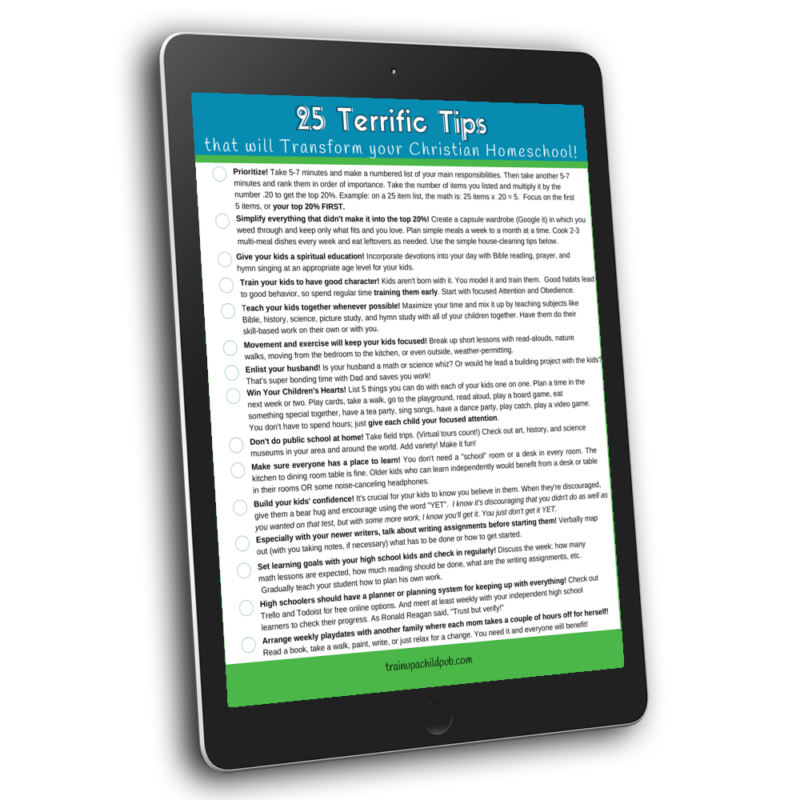12 Surefire Ways to Prepare Your Middle School Child for High School
I remember driving my middle school son and his friend to another friend’s house. They entertained themselves during the drive by trying to lick their elbows. As crazy as it sounds, this is the time we need to prepare our our middle school child for high school. What??
Middle School children are unique, to say the least! They’re bouncing back and forth from childhood to pre-adolescence. Their hormones are raging, they can be emotional, impulsive, and moody.
Yet at the same time, we know a lot of positive developmental changes are also taking place.
These are big changes! So although it’s a little overwhelming, now is the time to be guiding and helping your children develop their growing abilities.
This is the third post in a short series about preparing your middle school child for high school.
In case you missed it, the first post shows you how to teach your home-educated middle school child to work independently.
The second post talks about the best teaching methods to take advantage of your middle school child’s developing mental abilities.
And this third post summarizes prior ideas and adds several others to create a nuts and bolts list of practical things you can do to prepare your middle school child for high school.
Sometimes as a busy homeschool mom, you don’t have the time to study the theory of things—you want a list of things you need to do!
So keep reading for a list of 13 practical things you can do to prepare your middle school child for high school.
1. Help your growing and maturing middle school student to get enough sleep, drink enough water, and learn the importance of nutrition.
Of course, these are things that you’ll have to demonstrate, talk about, and sometimes have to point out what the benefits/consequences of not doing these things. This is most effective when you’re seeing these benefits or consequences.
“Yes, I bet it IS hard to concentrate. When I eat a lot of carbs and not enough proteins, I lose steam, too.”
You’ll expect your middle school child to be more independent in high school, so helping him or her develop these basic habits during middle school will prepare him for high school and adult life.
2. Teach your middle school child life skills to prepare him or her for high school.
Middle school children are at a pivotal point in their lives. If you haven’t focused on this already, it’s time to teach your middle school children to take responsibility for themselves. For example:
- Have your students get themselves up in the morning.
- Help them learn to organize their space and time—planning for schoolwork, chores, and outside activities.
- Guide them in making, tithing, and saving their own money.
- Expect them to start paying a portion of the cost for their outside activities.
- Require your middle school child to take care of the family pet. (Parents should not have to feed, water, walk, brush, bathe, pick up the yard, or clean the litter box on behalf of a pet, IMO.)
Not only should they be taking care of themselves, but they should also be contributing to the household (see pet comment above).
Middle school students can learn how to cook, do yard work, and clean the house and the car.
If you start now, by high school, your middle school students should be able to do most of the things you do on a regular basis.
Your goal is not only to bring your kids’ home education to life, but you want to show them how to have a happy, thriving home. So teach them the life skills they need to make that happen.
3. Give your middle school students plenty of face time.
Talk to your kids about what they are doing. About their friends, what they’re reading about, and about their likes and dislikes.
Also, share what you are learning about, what God is teaching you, what you’re interested in, what you are doing at work, what you are reading…etc.
Now is the time to solidify your relationship!
4. To prepare your middle school child for high school and beyond, teach him how to find the answers himself.
Continue teaching your middle school student how to (safely) research online and use a dictionary, thesaurus, encyclopedia, atlas, and map. Send him to the reference librarian at your library with questions to find the answers to.
And as your child researches, teach her the need for and how to evaluate the resources she is reading. Have her ask herself:
- Does this author have the knowledge, experience, and/or credentials in the field he or she is writing about? Does this author make claims that aren’t backed up by his/her experience?
- Is this author’s work verified by other things I’ve read?
5. Read like crazy.
Make sure YOU are reading frequently in front of your children. Help your students learn to pursue their interests by seeking books on the subject(s).
Strongly encourage your middle school student read for pleasure every day. Even choosing books beneath their reading level is fine for free reading. It will still help your middle school students build reading fluency.
Reading well is one of the most important skills your child can learn that will take your middle school child far!

6. Prepare your middle school child for high school by helping him make connections.
Experts say that learning takes place when we connect new information to what we already know. Here’s an example of how to do this.
You say, “The Roman Empire lasted about a thousand years. That is a long time!
Let’s compare that to how long the United States has been in existence.”
Then, do the math: “If we take this year and subtract 1776 from it… how long has the United States been in existence?
And voila — the light bulb goes on. Your kids suddenly have an appreciation for how long the Roman Empire lasted now that they can compare that information with what they already know about the U.S.
7. Learning = Writing
sing a literature-based homeschool curriculum instead of a dry writing program that has nothing to do with the rest of your what your kids are learning.
Why is that? Because researchers have discovered that integrating subjects is a more natural way to learn. Our brains are wired that way!
Have your kids write about the history, science, people, events, and books they are reading. Even about how to do a math problem. (Being able to write the steps to solve an algebraic equation is the best way to find out where your child is getting mixed up.)
Also, have your younger middle school child write about how to do something, like make a peanut butter and jelly sandwich. (Then you make it following the directions. This is usually eye-opening for your student and a fantastic exercise in writing clear directions.)
Additionally, have your middle school students write reviews of books, movies, plays, and music. Encourage journaling, writing letters to grandparents, pen-pals, servicemen, and thank you notes.
8. Prepare your middle school students for high school by teaching them how to take notes.
Writing while listening is a complicated, acquired skill that takes LOTS of practice (and is still difficult for some children who have fine-motor issues).
Have your students start practicing taking notes from sermons, oral instructions, books, and from non-fiction movies/videos.
Taking notes is incredibly useful to learn before high school begins and will also be a leg up on college. So now is the time to learn and practice this skill.
9. Continue to have your Middle School students practice oral and written narration.
Teach your middle schoolers to tell you about what they read, have heard, and seen. With practice, they’ll become much better at clearly articulating and organizing their thoughts and remembering details.
Written and oral narration will help prepare your middle schoolers for the more academic writing required in high school.
10. Teach your middle schoolers to keyboard if they haven’t learned already.
Keyboarding is another acquired skill that pays great dividends, especially for reluctant writers. Learning how to use a computer now will save time and effort in high school and beyond.
11. Prepare your middle school students for life by teaching them to be World Citizens.
Give your students a headstart on more advanced geography studies by regularly incorporating them into your day. Look on a map/globe to see where your friends/relatives/missionaries live or are traveling.
Pinpoint on a world map where an event you read or heard about is taking place. Look up and map out where Christians are persecuted, where there are current military struggles, where wars or natural disasters are occurring, and pray for the people involved.
12. Move your middle school students to think beyond themselves.
In addition to thinking more globally, practice helping your middle school student look around him and see where he can be useful.
Middle schoolers can be very self-centered without much effort. (You may have noticed that already.)
Ensure your children, especially your middle school and high school children, are involved in serving others. Begin with your own family, your church, and your community. You don’t want to wait until high school to instill this value!
There’s nothing more unappealing to a possible employer than an entitled attitude in a young person (or a person of any age, really) seeking a job.
It will broaden your middle school student’s empathy for and understanding of others to serve in a soup kitchen, at homeless shelter, or with the family on a mission trip.
13. Encourage, encourage, encourage
Along with self-absorption, this age group often experiences a lot of self-doubt. Make sure your middle schooler knows that you’re his biggest fan!
Here are tips for teaching your kids to believe in themselves.
You’ll be surprised to learn how much you say to and about your middle school influences her attitude about herself!
This article also shows you the benefits of teaching your middle schooler to work hard to learn or accomplish things. This effort pays huge dividends on self-confidence and even can make his brain bigger!
If you work now to prepare your middle school child for high school, you’ll have a much easier time teaching high school, and your students will find it easier to move on to college and to life beyond.

*The first article of the series: Preparing Your Middle Schoolers for High School – Part 1 – What Are His Goals….Really?
The second article of the series: Preparing Your Middle Schoolers for High School – Part 2 – Taking Advantage of the Intellectual Growth Curve

